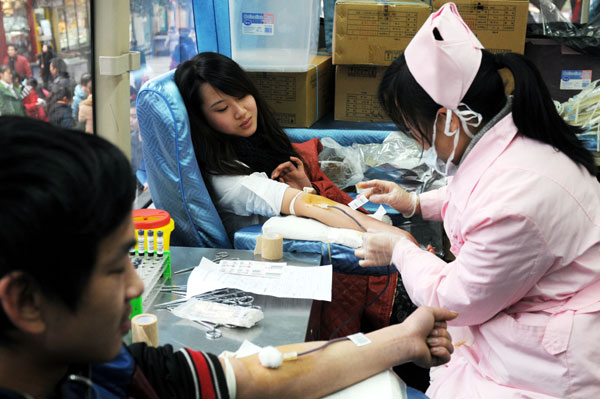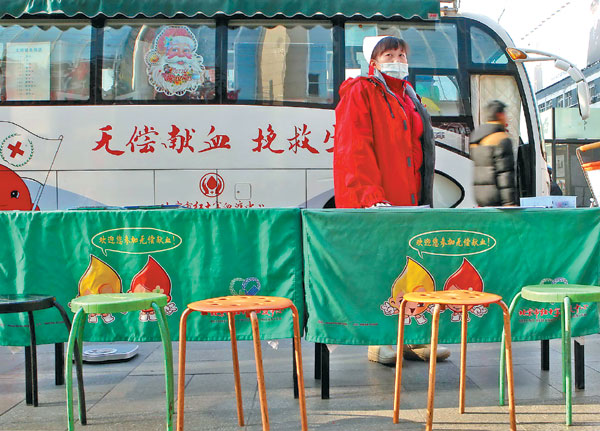Patients may be their own best blood donors
Updated: 2011-12-27 09:53
By Yang Wanli,He Na and Tang Yue (China Daily)
|
|||||||||
High costs and poor publicity hinder process from gaining greater popularity, Yang Wanli and He Na in Beijing, and Tang Yue in Tianjin report.
Li Dongliang, 47, had his right knee replaced in early September. He used 1,900 cubic centimeters of donated blood during the surgery in Yunnan.
Because there is always a shortage of donated blood, three of his relatives contributed 1,100 cc at the local donation center to reduce Li's waiting time for the operation.
|
 |
|
Restaurant workers in downtown Chongqing make donations aboard a bus that provides mobile blood collection service. Shortages have long been a problem in China, where less than 1 percent of the population donates blood. Zhong Guilin / for China Daily |
Prior to the operation nobody mentioned a better option - autotransfusion.
"What's that?" Li's wife asked.
After being told it's a process that allows patients to bank their own blood ahead of time or for blood to be salvaged during surgery, she said: "No doctor told us about it. If we had known earlier, we would have asked for it instead of using donor blood."
The primary advantage of autotransfusion is that it eliminates the introduction of undetected disease. It also is considered to be the most effective and economical way to manage blood loss in emergencies.
But it is little used in China. The equipment is expensive, and some hospitals are not set up to store the blood properly. Some people fear that self-donating blood might be too taxing, or that their blood might be misused, or that the process isn't sufficiently regulated.
The biggest reason, however, is that too few people know about it.
"I haven't met a single person who raised the question of autotransfusion to me. Never," said Cheng Gang, deputy director of Jinan Blood Station in Shandong province.
Out of 25 people lined up to register at Beijing's Sino-Japanese Friendship Hospital on a Wednesday morning, only one had even heard the word before.
It isn't newThe first documented use of autotransfusion was in the 1920s in England. Now in Japan and some other developed countries, most blood for clinical use comes from the patients themselves.
Beijing SciTech reported that 80 to 90 percent of non-emergency surgery in European countries is done with autotransfusion - but only 1 percent in Beijing, which has the best medical resources in China.
The country's Blood Donation Law, which took effect in 1998, has clear rules for autotransfusion. Article 15 encourages patients who are planning non-emergency surgery to provide their own blood in advance, so that sufficient other, donated blood will be available for use in emergencies.
Precious resource
Blood shortage has long been a problem in China. The Beijing Red Cross Blood Center issued an emergency call for donors in October. The response pushed the amount of blood at the center to 8,000 units, but that is still far below its standard of 12,000 units.
|
 |
|
Despite the festive spirit, a blood donation point in Wangfujing, a prime shopping district of Beijing, struggles to attract donors on Monday. A shortage of donated blood means operations are delayed at many hospitals. Wang Jing / China Daily |
"The inadequacy of voluntary donation, the rising demand in clinical use and disproportionate demand in different regions have all contributed to the problem," said Ministry of Health spokesman Deng Haihua.
The number of voluntary, unpaid donors in China rose from 6.75 million in 2006 to 11.8 million last year, and the volume of blood increased from 2,995 to 3,935 tons. But it can't keep up with demand. Deng said the blood supply rose about 7 percent last year and the number of surgeries increased 18 percent.
China is among 70 countries worldwide with a blood donation rate of less than 1 percent of the population, a rate the World Health Organization considers to be the minimum necessary. The average in high-income countries is about 4 percent.
"Everyone who works in the blood center in China knows how precious every single drop of blood is," said Yang Wenling, director of Tianjin Blood Center.











